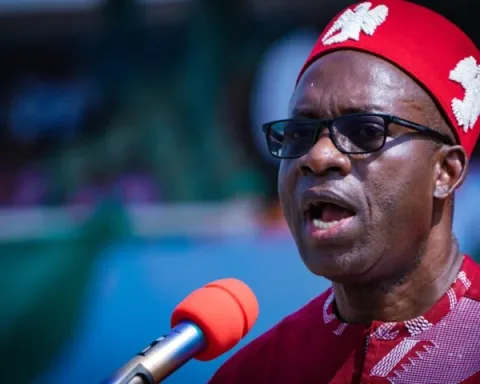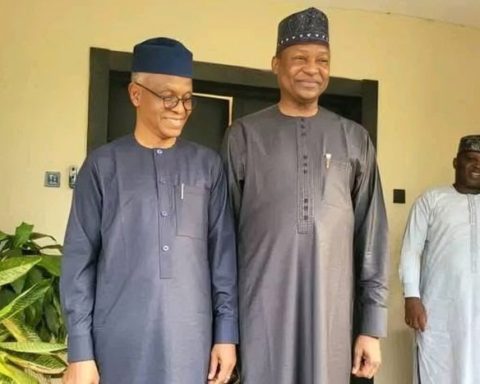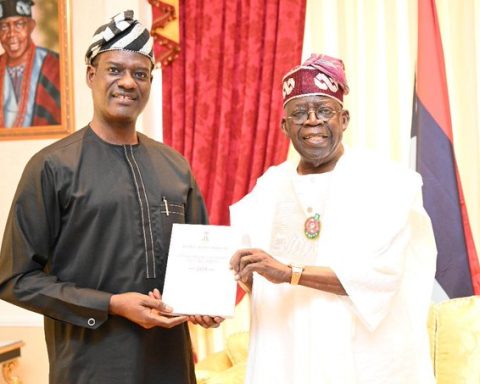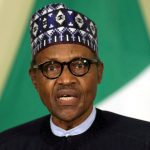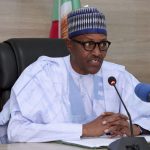Former President Goodluck Jonathan has cautioned that the suspension of elected officials in Rivers State could severely damage Nigeria’s global reputation. He made this statement during the Haske Satumari Foundation Colloquium in Abuja, expressing concerns over the political turmoil in the state. “These actions by key actors in the executive and legislative arms of government paint the country in a negative light,” Jonathan said.
His warning comes after President Bola Tinubu declared a state of emergency in Rivers State and suspended Governor Siminalayi Fubara, Deputy Governor Ngozi Odu, and members of the state House of Assembly for six months. The decision has sparked widespread criticism from political leaders and legal experts.
Join our WhatsApp ChannelREAD ALSO: Declaration Of Emergency Rule In Rivers A Recipe For Anarchy – Kwankwaso
Impact on Nigeria’s Image and Investment Climate
Jonathan stressed that a country’s image directly affects its ability to attract investments. He noted that investors consider political stability before committing funds to any economy. The crisis in Rivers State, he warned, could make Nigeria less attractive to foreign investors.
“When political instability becomes the norm, it discourages businesses and affects the economy negatively,” he stated.
Political analysts argue that Nigeria’s democratic institutions must function independently without undue interference. The suspension of elected officials in Rivers State raises concerns about the executive arm’s influence over state affairs.
Legal Experts Question Tinubu’s Decision
The decision to suspend Governor Fubara and others has drawn criticism from legal experts. The Nigerian Bar Association (NBA) President, Yakubu Maikyau, described the action as unconstitutional. He warned that suspending elected officials does not resolve political conflicts but instead deepens division and weakens democracy.
The 36 state Houses of Assembly in Nigeria have recently moved to unify their rules on the suspension and impeachment of lawmakers. This development aims to prevent arbitrary political decisions similar to what has happened in Rivers State.
Political Tension in Rivers State
The suspension of Fubara and others has escalated tensions within Rivers State. Political observers say the situation could lead to further unrest if not handled carefully. Some stakeholders believe that dialogue remains the best solution to the crisis.
Ibinabo Fiberesima, a political commentator, argued that Fubara’s silence amid the crisis might have contributed to the political uncertainty in Rivers State. She urged him to take a firm stand and engage in active dialogue. “The only mistake Fubara made was staying silent for too long,” she said.
Democracy Under Threat?
Jonathan’s concern about Rivers State reflects a broader fear that Nigeria’s democratic institutions are under strain. The former president rarely comments on political matters, but his decision to speak out highlights the seriousness of the situation.
Many Nigerians believe that political stability in Rivers State is essential for maintaining the credibility of Nigeria’s democracy. Opposition leaders have also condemned the move, calling it a dangerous precedent that could weaken state governance.
What Next for Rivers State?
As Rivers State faces an uncertain political future, many are calling for a peaceful resolution. Analysts suggest that President Tinubu should reconsider the decision and allow democratic processes to take their course.
With ongoing criticism from legal experts, political leaders, and civil society, it remains to be seen how the federal government will respond to the growing concerns over the situation in the State.
For Nigeria’s democratic institutions to remain strong, observers say political decisions must align with constitutional principles, ensuring fairness and justice in governance







